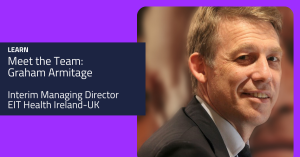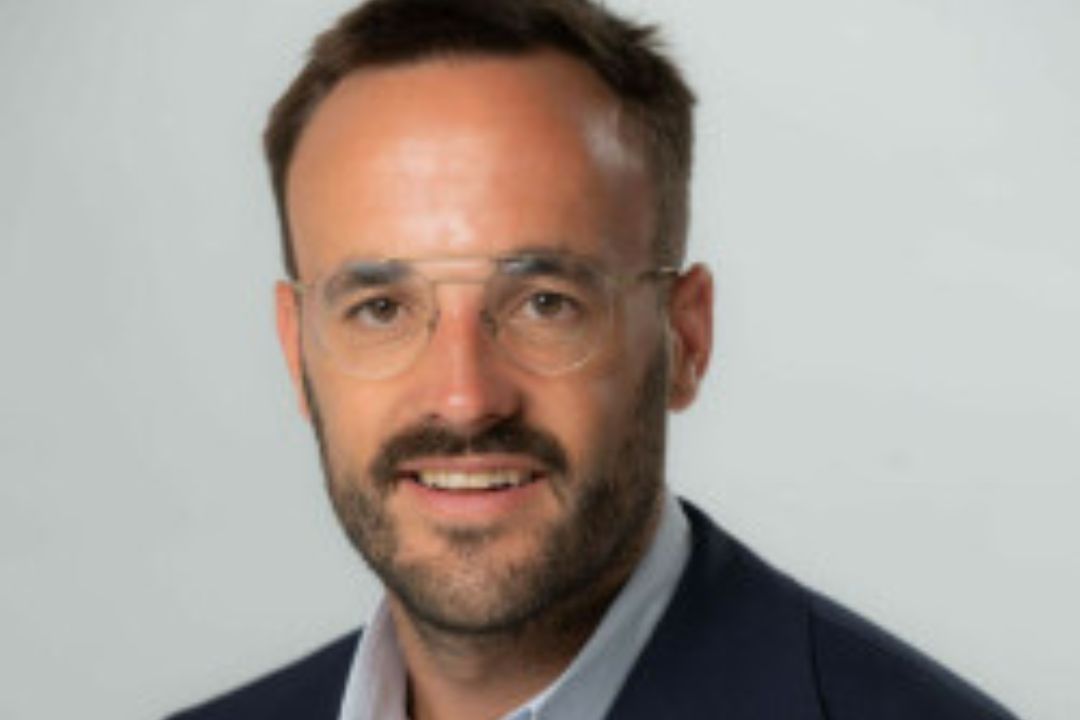31st May 2022
Whilst preparing for the latest instalment of our Meet the Team blog series we decided it is an opportune time to re-introduce Graham Armitage. Graham has been with EIT Health for over 2 years and before that served as a board member to EIT Health’s Ireland-UK hub, representing academic partner Newcastle University.
Graham, formerly Deputy MD and Collaboration Lead, recently took over the reins from Leslie Harris as Interim Managing Director at EIT Health Ireland-UK. Graham has great knowledge of all things EIT Health, both from the partner perspective and internally. He therefore has continuously been a fantastic support to the team and a friendly, familiar face across our neighbouring European hubs. Graham is on track to continue Leslie’s excellent work in supporting Ireland-UK’s exceptional partners.
During our chat, Graham told us about his journey to date, the types of health innovation projects he has been part of, and what his top tips are for innovators seeking to make an impact on European patients’ lives.

What did you do before you joined EIT Health?
I gained a lot of my management and leadership experience from an 18-year career as an officer in the Royal Air Force. A brief period in the Australian defence industry followed but on my return to the UK I transitioned to innovation, joining Newcastle University’s world-class ageing research environment. It was in that 12-year role that I was initially involved in the development of Innolife, a proposal for EIT Health.
How was your experience of working with EIT Health from the partner point of view?
It was great to get an international perspective. My experience of healthcare innovation previously had been very much focused on the UK. It was also exciting to work with new partners on projects that we had not thought of doing. The funding was beneficial as it allowed us to grow the team and to explore some of our capabilities. However, it was the network that really provided lasting value, with long term relationships set up between all sorts of departments within the University, not only the School of Medicine and the TTO. It connected us with a broad range of European partners.
What do you think partners consider to be the most valuable aspect of EIT Health’s network?
Well the funding was always useful, but it is typically less than the commercial value of the services provided, so it needs to be used for activities you want to do anyway. From my experience, the real value comes from the ability to identify partners and projects for new opportunities, that align with the partner’s own needs and aspirations for impact, and of course to make them happen.
Tell us about an impactful innovation project you have seen progress from ideation to completion at EIT Health?
One of the first projects I was involved with we found accidentally. It was the first year of EIT Health awards and Newcastle was invited to participate with Berlin Heart and others in the MACH project. Because it was the first time for everyone participating, the project was a huge learning curve for us. The project ultimately led to the development of the Excor Active Vascular Assist Device.
This fantastic development allows children with heart defects to leave the intensive care unit, making a massively positive impact to their lives and those of their parents . It also saves large amounts in care costs. The project went on to win a Horizon Impact Award. In 2021, 5 years after the start of the project, 18-month old Grace Littlewood, at the Great North Children’s Hospital in Newcastle, where some of the project work was done, became the first child in the UK to have one of these units, making it possible for her parents to take her out of the hospital for a walk in the park.
What advice would you give to partners and other interested parties seeking to build consortia for the next innovation call?
Keep it simple, complexity costs time and effort.
- Identify the project must haves and try to build the minimum eligible consortium to provide for those needs.
- Set up trial sites in your target markets, so that you are already exposed to the local opinion leaders.
- Give yourself plenty of time to construct the project, the budget will take way longer to work out and agree than you think.
- Build a skeleton of parties you know and/or trust and only add ‘outsiders’ where they are essential and / or the best.
- Make sure that you really understand each other and your respective roles before you get to the hearings.
In your opinion, what is one of the best health innovations in history?
Vaccination. We’re really aware of it at the moment because of the pandemic but we usually forget the huge number of lives and disabilities that have been saved by vaccination against what were previously common diseases.
What’s next for EIT Health Ireland UK ?
We have a strong team, now largely based in Ireland, and we have begun to engage the Irish innovation ecosystem in a way that we have not previously managed. I’m pleased to say that we have retained the engagement and active participation, despite the funding implications, of some of our UK partners, alongside those from Ireland, and we will continue to value those connections. There is a role for all our partners and friends in this.
If your organisations is interested in becoming an EIT Health partner, or seeking to join a consortium for an innovation project, get in touch: clc.ireland-uk@eithealth.eu
New data shows AI innovation needs skills beyond coding

The largest live dataset of AI start-up talent analysed.
Europe's top health start-ups take centre stage: EIT Health Catapult winners are revealed at HLTH Europe

2025 Catapult programme winners announced.
Finding Europe’s next healthtech leaders: Insights from Antoine D’Hollander

Insights from Antoine D’Hollander, Capricorn Partners.